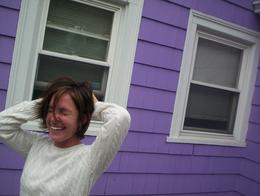 Advice from a friend, and a trip back in time, help the Independent’s schoolteacher- diarist hold back the tears when a student needs her to be strong.
Advice from a friend, and a trip back in time, help the Independent’s schoolteacher- diarist hold back the tears when a student needs her to be strong.
Nov. 16, 2005
On Monday night, I went to my good friends Mark and Marcia’s house. Both are teachers and have been for a long time. Besides the fact that it’s nice to have them in town for friendship, it’s also comforting to talk to them about teaching.
While we were eating, I told them about Brinn. At the time, I didn’t know that her mother had died, so I was telling them about the time Brinn came to me to tell me that her mother had cancer. I told Mark and Marcia that I could do nothing other than break down and cry with Brinn because I could physically feel how much she was hurting, and because her pain touched a memory of my own pain that I’d believed I’d buried down deep for good.
But as I was telling these two teachers about my talk with Brinn, I could see Mark shaking his head in the way only a veteran teacher can toward a novice.
“I have the same problem with my daughter,” he said. “But I can tell you that she doesn’t want me to break down with her when she is upset. She doesn’t want me to show that I am unstable.”
I thought about the days after my father died and I would see my mother crying. I hated to see her cry. I didn’t want her anywhere near me when she was sad. I know it sounds counter-intuitive: grieving people should want to comfort each other. But in my case, I wanted to be as far away from the person who was supposed to give me comfort, who in the moment wasn’t looking very strong. I needed my mother to be able to shoulder my pain. I needed to be the one who was freaking out. I needed to be the unstable one.
So this morning, Brinn knocked on my door. I was surprised to see her at school so soon; I’d imagined she’d be out for quite some time. I started to give her a hug when I opened the door, but she walked by me: “Nah, Miss. I’m not havin’ that.”
We walked across the room and sat down on some desks. She held a newspaper in her hand, and I didn’t think much of it until I realized that it was probably the obituary.
“Can I see it?” I asked, and she handed it over to me.
I read the short piece underneath a picture of her mom —-” healthy, happy, smiling. “Survived by — ¬¶” and it listed eight names, one of which was Brinn’s. I couldn’t remember if I’d seen my own name in a similar write-up 12 years earlier.
Brinn wouldn’t look at me this morning. She mostly just talked over her right shoulder as I sat next to her on her left.
She began to tell me how she didn’t want to go home or be in her house with her brothers. She told me how, when one of her brothers found out, he went crazy and drank a lot down by the train station. She said that another brother, who is in jail, isn’t allowed to go to the funeral. So the cops will probably bring him to the casket at 4 in the morning so the family won’t try to help him escape. She said her family couldn’t stick together now that the glue wasn’t there anymore.
God, did I know how she felt. At times, the tip of my nose tingled with the threat of tears, so I pressed on it to make it stop. My lip wanted to quiver but I bit it to keep it still. I remembered Mark’s words. I remembered how I felt when I was in Brinn’s shoes. I knew that in order for her to feel safe enough to break down, I had to shoulder her pain —-” as much as I felt I could.
Just before the bell rang for the start of classes, I looked over at Brinn and noticed that a tear was falling down her cheek. I’ve seen Brinn tear up only once before; she is a strong, very stoic girl who wears a thick coat of protection all the time. I jumped down from the desk and stood in front of her.
“It’s going to be a rough couple of days. It’s going to be a rough couple of weeks. And months.” Her tears fell onto the obituary, tiny drops bleeding out onto the paper into big wide spots, perhaps a physical representation of her sadness: show a little, feel a lot.
“But you’ll get through it,” I kept on. “One way to get through it is by writing. Would you like a journal? To help you when you feel overwhelmed?”
She nodded and chose a blue notebook. I gave her a bright blue pen, and she left the room to go to class.
When she closed the door, I sat at my desk and started writing, only a sentence or two, but it was enough to get Brinn’s words and emotions off of my shoulders and into a place where I could see them and stare at them.
I felt stronger.